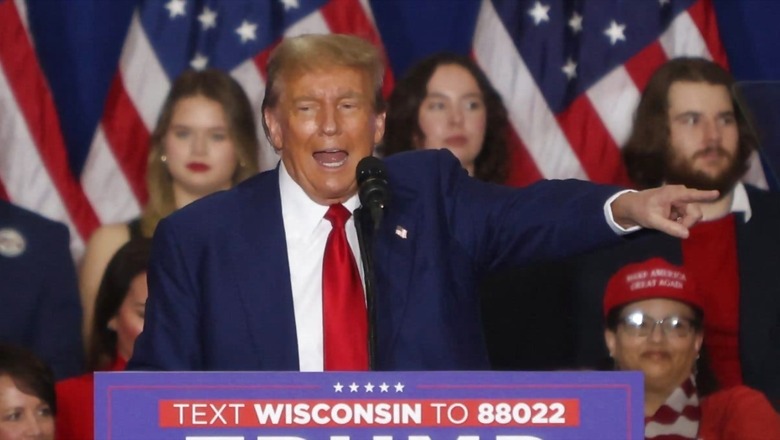
views
There are numerous reports of anxiety and apprehension in some parts of the world about the possibility of the return of Donald Trump to the White House post 2024 presidential election in the United States. Many countries fear that the world order under the Trump 2.0 is going to drastically change and preparations should begin to confront the coming challenges before it is too late. Is the world order going to be radically different, if Donald Trump becomes the 47th President of the United States?
Most of such apprehensions come from the trans-Atlantic allies of the United States. During his presidency, Donald Trump’s language and tone regarding the relevance and viability of the North Atlantic Treaty Organisation were harsh and unsettling. But the main message from the Trump White House for the alliance partners was to follow the norm of defence burden sharing and make contributions of 2 per cent of their respective GDP for collective defence. Trump’s communication was downright clear; it had an effect on the members and today about two-thirds of NATO members spend 2 per cent of their GDP for defence.
Donald Trump during his current campaign for the presidential position has yet again sought to frighten the NATO members who are yet to comply with the requirement by saying that he would allow Russia to do anything it wants with such NATO members. This statement has sparked anger, fear and disenchantment in Europe because of its timing. First, Trump’s remark was made amidst Russia’s continuing war in Ukraine. Second, Trump is against spending billions of dollars to back Ukraine defend itself against Russia. Third, it is largely because of him that the US Congress has not yet been able to authorise more than $60 billion of additional aid to Ukraine. Fourth, he has bragged that he would end the war in one day if he is elected. This has created a perception that he may allow Russia to annex the areas it has occupied in Ukraine as part of the deal to end the war.
However, Trump has clarified that he will not withdraw from NATO. There are talks about defence capability building in Europe and Trump’s statements have energised the countries that have for long supported a militarily stronger Europe. Trump 2.0 administration would certainly accept the idea of a stronger Europe, which will actually be effective defence burden sharing. Thus not much change in trans-Atlantic ties is likely to an extent that would affect the global strategic order.
It is important to note that it was Donald Trump who sought to shape the Indo-Pacific order by issuing a strategy report in 2017; reviving the dormant Quadrilateral Security Dialogue, adopting a tougher stance on the unfair trade practices of China and engaging in a tariff war with Beijing and further strengthening defence and security partnership with India for maintaining peace, stability and freedom of navigation in the Indo-Pacific.
Significantly, his successor President Joe Biden did not alter Trump’s strategic initiatives in the Indo-Pacific and rather built upon them by elevating Quad to summit-level meetings and operationalising it with working groups, by launching the AUKUS defence pact with the United Kingdom and Australia, which may be expanded to include Japan in the near future and standing behind Taiwan and the Philippines in the face of Chinese aggressive postures and grey zone offensive moves.
As far as the hydrocarbon resource-rich West Asia is concerned, Donald Trump during his presidency successfully engineered the Abraham Accord as a positive step towards promoting peace in the region and enhancing Arab-Israeli constructive interactions. Under American inspiration and encouragement, the UAE and Bahrain signed agreements with Israel. Trump was dead against the nuclear deal with Iran, but Biden has not been able to do much to revive the deal and Washington’s relationship with Iran is anything but friendly.
Both Trump and Biden are pro-Israel and no matter who wins the election, US-Israel strategic cooperation will endure. While Trump is credited with signing of the Abraham Accord, Biden encouraged a new quadrilateral cooperation mechanism consisting of India, Israel, UAE and the US (I2U2). Biden did not oppose the Abraham Accord and Trump 2.0 is unlikely to dispute I2U2. Thus no discernible transformation in the broader strategic order in West Asia is likely to come about post 2024 US election.
The world has lived with Trump Administration 1.0. The transition period after Trump’s victory in the 2016 presidential election was a little chaotic. None expected a business tycoon and a political outsider like Trump to win the election. The Trump team was not ready with any blueprint for the administration to lead the global affairs. But the Trump 2.0 administration, if it comes about, will not be as muddled. Think tanks and several advisors and experts supporting Trump are quietly working on projects, schemes and missions to make the transition orderly and peaceful.
What worries and confuses the international community is the artless language and raw rhetoric used by Donald Trump during the campaigns. His statements can hurt or bring delight, embolden the adversarial nations and frighten friendly countries, but a little dissection and reading between the lines make it clear that Trump will do whatever he thinks to be good for America and, of course, for his party.
The world order takes decades to form and no single country can shape it in full. Trump has to respond to events abroad and the actions of other powerful and influential countries. And the international community likewise will have to respond to the Trumpian approach to global affairs. Prime Minister Narendra Modi-led NDA government has had deep experience in dealing with President Trump. If the current trend continues in Indian politics, the NDA under the leadership of Modi will form the next government after the national elections. There is little to be concerned about the Trump 2.0 administration in the US.
There will be certain bilateral differences over trade and investment issues between India and the US. The strategic convergences between India and the US will be durable and effective. India will remain a strong partner of the US in shaping events in the Indo-Pacific and West Asia that will contribute to global peace and stability. What India needs to cogitate upon is the ways and means of coordinating with the US to work on the existing mechanisms, such as QUAD in the Indo-Pacific, I2U2 in West Asia; Indo-Pacific Economic Framework (IPEF) and India-Middle East-Europe Economic Corridor. Trump 2.0 administration will most likely try to modify a bit to suit its vision and mission and India has to remain prepared in advance.
No great changes are thus likely to take place in the global order. There will be no Trump 3.0 administration ever. Hence Donald Trump will most likely seek to leave his positive imprints in the history of global affairs that will be long-lasting.
The writer is founder chairperson, Kalinga Institute of Indo-Pacific Studies, and formerly Professor at JNU. Views expressed in the above piece are personal and solely those of the author. They do not necessarily reflect News18’s views.


















Comments
0 comment